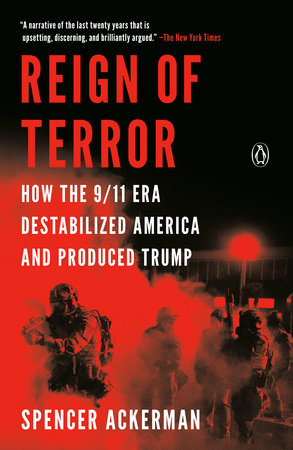Ackerman goes on to chronicle the boomerang effects of militarized weaponry, tactics, and culture. In this project, Reign of Terror joins the scholarship of historians like Kathleen Belew and Karen J. Greenberg, along with many other academics and reporters cited by Ackerman. But Ackerman insists on an even more discomfiting verdict: the U.S. security policies that have contributed to the hollowing out of American democracy and encouraged the rise of Donald Trump and the far right are part of a longer story of domination that can be traced back to the nation’s founding as a settler-colonial project and slaveholding behemoth. The title of the book itself, an explicit reference to the French Revolution, is an implicit jibe at how perseverations over the crimes of lowlier challengers can obscure the more lasting cruelties of the Global North.
Ackerman’s career as a journalist spans nearly the entire War on Terror. He has embedded in Afghanistan and toured Guantanamo Bay’s notorious detention camp, interviewed generals like David Petraeus and Stanley McChrystal, and played a central role in monumental scoops like the Snowden leaks. The breadth of his knowledge and experience are evident throughout Reign of Terror, which focuses primarily on political dynamics within the United States. Ackerman moves chronologically from the immediate legislative aftermath of the 9/11 attacks to the bipartisan establishment of more long-term national security conventions in government and media during the Bush and Obama years to a more warped iteration of those conventions with the rise of Trump.
The book maps the granular divides within the pro-war coalition of the past twenty years, from its neoconservative leaders and nativist supporters to its apologists on the left. By tracking the evolutions of its various factions, Ackerman provides important reminders about a number of figures who today claim virtuous opposition to the unreason of Trumpism. Take Liz Cheney and Bill Kristol: before they became Never Trump lodestars, their organization Keep America Safe elevated people like Debra Burlingame, who paired righteous indignation about the death of her brother (the pilot of the hijacked Flight 77) with scaremongering on issues like the so-called “Ground Zero mosque” that would become the bread and butter of Trump’s GOP. Many on the center left joined with conservatives in dismissing dissenters from the War on Terror. In the New York Times Magazine, George Packer lectured antiwar critics on Iraqi support for the war. In the New Republic, Leon Wieseltier proposed that any opponent of the military intervention couldn’t count as a true liberal.
